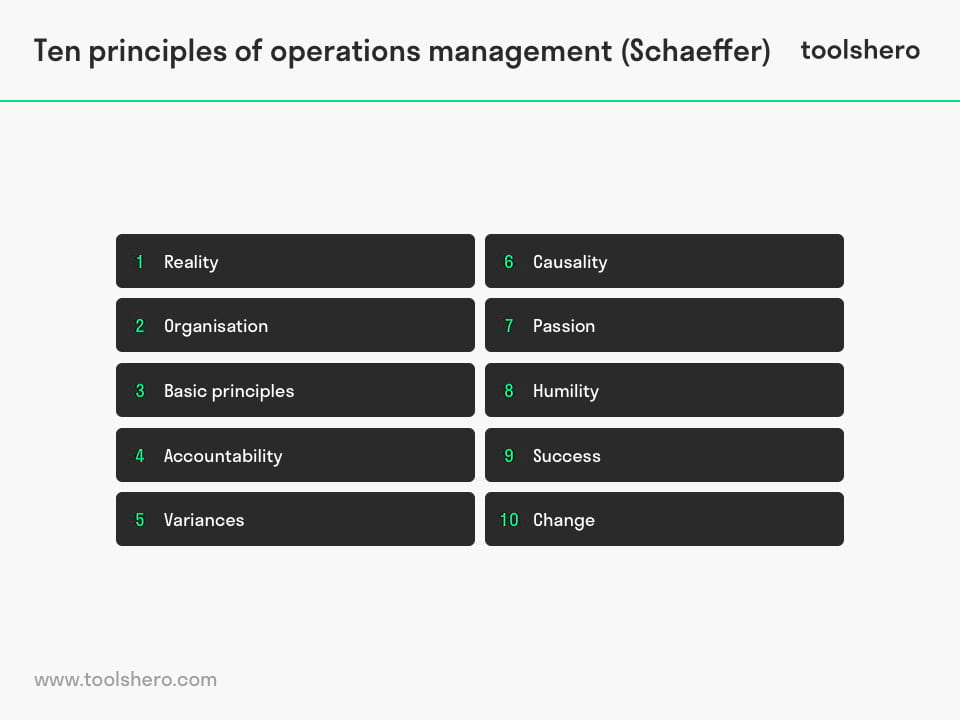Operations Management explained

Operations Management (OM): this article explains Operations Management (OM) in a practical way. It covers what operations management is, what its basic functions are and what the 10 principles of Randall Schaeffer are. It also discusses trends in operations management. After reading the article, you’ll understand the basics of this important management element. Enjoy reading!
What is Operations Management (OM)?
The definition of Operations Management
Operations Management (OM) is a branch of management focused on designing, managing, and improving production processes and company activities related to the production of goods and services. The objective of OM is to imply improvements leading to increased profitability.
The functions of this multidisciplinary branch of management form the cornerstones of organisations all around the world. It ensures that business operations are as efficient as possible in terms of their use of means, and that consumer demands are met.
This mainly deals with planning, supervision, production, and organisation in a production setting. All of these core activities allow the organisation to create value in the value chain, and that input such as staff, material, equipment, technology, and other resources are turned into valuable output.
OM has many similarities to supply chain management and logistics. However, supply chain management also deals with understanding worldwide trends in supply and demand, as well as consumer demands.
OM was formerly known as production management. It has been around for a long time and started when craftspeople in whichever period organised their work. It spread widely and eventually led to the industrial revolution, with Henry Ford’s assembly line as its most important milestone. Effective operations management is crucial for achieving business goals and increasing production in a systematic and efficient manner.
Operations management involves overseeing the transformation of raw materials into finished goods or services, with a focus on efficiency and cost-effectiveness. Efficient planning and organization are fundamental to to streamline processes, allocate resources effectively, and meet production targets.
Basic functions of Operations Management
Operations Management (OM) includes the planning, organising, coordinating, and checking all the means that are required to produce a company’s products or services.
The chain connected to the entire planning and production process is made up of many different parties, all of which work according to their own planning. Hence, the functions below include basic functions of operations management in general.
Planning & Design within Operations Management
Planning in OM deals with formulating demands and objectives, milestones, conditions, best practices, and procedures.
The strategic planning indicates which part of the strategy will be activated at what point during a specific period. An operational plan is usually the basis and the justification during a budged request for operations within an organisation.
An effective management strategy in operations management involves meticulous planning, organization, and coordination of various activities to achieve desired outcomes.
Organising / Coordinating
A smoothly running production facility or other location where production takes place is still in constant need of competent management in order to prevent mistakes and to strive for zero defects (ZD).
Management ensures that the entire process remains efficient in as many areas as possible. For example, the processes that provide optimal results are selected for a specific task, and only the right materials are chosen. Maintenance also includes organising and coordinating, as well as keeping up the inventory.
As with all management functions, this branch involves other aspects as well, such as employee management and supporting management functions. A well-designed production system is essential for smooth operations management, optimizing resource utilization and minimizing bottlenecks.
Checking & Improving
Existing processes and company activities can often be improved, even if they are already performing above expectations. Improvement can take place in many different aspects, such as capacity, quality, or production. Total Quality Management is often used as a methodology for ensuring quality. Quality control is an integral part of operations management, ensuring that products or services meet or exceed customer expectations.
Supervisory Positions within Operations Management
OM is often about situations in which large production processes are managed and that involve many employees. In order to manage all of that, multiple supervisory positions are used.
Operations Management: 10 Principles by Randall Schaeffer
Randall Schaeffer is a professional in the area of Operations Management and a philosopher. He is regularly invited as a speaker to conferences hosted by APICS, a leading American supply chain management organisation. He developed the ten principles of operations management.

Figure 1 – Ten Principles of Operations Management (Randall Schaeffer)
Principle 1: Reality
The first principle is the reality principle, which states that there are no methodologies or theories that can solve all problems. There is no universal solution to everything, which is why the organisation should focus on the problem instead of on techniques.
Principle 2: Organisation
The organisation principle states that all aspects of production should be organised and run like a well-oiled machine. This principle was developed from the idea that, even though everyone can combine different components, that is not a guarantee for profit. If profit is to be predictable, all activity leading up to that profit should be as well.
Principle 3: Basic principles
Operations Management is about applying and understanding the basic principles. Among other things, the Pareto principle applies to OM: 80% of success comes from the careful monitoring of data and compliance with procedures, while 20% comes from the application of new techniques.
Principle 4: Accountability
This principle is about the fact that people should have accountability, otherwise they will not make an effort. This also requires rewards in case of success, and accepting the consequences of poorer performances or negative behaviour.
Principle 5: Variances
Variances are inherent to every process. If the goal is to reduce costs, they should be carefully measured and checked. If the goal is to create more options, variance should be encouraged.
Principle 6: Causality
The causality principle means that problems are merely symptoms of what’s really going on. If the cause of the problems is not dealt with, the problem will continue to manifest. A tool for discovering the cause of a problem is the root-cause analysis.
Principle 7: Passion
According to Randall, the degree to which employees are passionate about their work can have a lot of impact on an organisation’s profitability and growth. For that reason, one of the manager’s duties is to ensure employees are sufficiently motivated and committed.
Principle 8: Humility
Instead of managers making costly mistakes, this principle states that managers should indicate their shortcomings and ask for help. A good manager does not consider their own mistakes failures, but asks for help and learns from them.
Principle 9: Success
The success principle assumes that success will often have to be redefined, since the market is changing as well. The most important thing here is that the customer should always be at the centre. Customer satisfaction is a key focus in operations management as it drives repeat business and fosters brand loyalty.
Principle 10: Change
Problems arise, solutions are found, and this will always continue. This is why it’s also important not to cling to old, known and proven methods. Change should be embraced and ensures long-term stability.
Trends in Operations Management
The changing environment, together with insecurity about the future, means that processes require new and innovative approaches in OM. A number of trends in operations management are listed below.
1. Business Process Re-engineering (BPR)
Business Process Re-engineering (BPR) is a widely used and radical method for reshaping company processes. It’s an effective tool for innovation, and results from before and after its implementation can be easily compared.
2. Lean / Six Sigma / Agile within Operations management
The Lean methodology, developed by the Japanese car manufacturer Toyota, is a recognised and proven tool in production environments. Because of the complexity of processes, it became necessary to find a way of adjusting these processes effortlessly. This lead to the introduction of the concept agile.
Another way of improving processes is by using the Six Sigma method developed by Motorola.
3. Sustainability
Because of the disastrous state of the climate and the regulations adopted as a result of it, companies are under pressure to work in sustainable ways. Among other things, this leads to companies voluntarily or compulsorily publishing reports about their sustainable performances. This reporting is done in accordance with a certain standard, for example the GRI’s or the IR’s.
Now it’s your turn
What do you think? Do you recognise the explanation about operations management? Do you see any resemblances to supply chain management? How are operations organised within your organisation? What do you consider important applications of operations management? Do you have any tips or additional comments?
Share your experience and knowledge in the comments box below.
More information
- Russell, R. S., & Taylor, B. W. (2003). Operations management (Vol. 3). ^ eNew Jersey New Jersey: Prentice Hall.
- Slack, N., Chambers, S., & Johnston, R. (2010). Operations management. Pearson education.
- Stevenson, W. J., Hojati, M., & Cao, J. (2007). Operations management (Vol. 8). Boston: McGraw-Hill/Irwin.
- Voss, C. (2010). Case research in operations management. In Researching operations management (pp. 176-209). Routledge.
How to cite this article:
Janse, B. (2019). Operations Management (OM). Retrieved [insert date] from Toolshero: https://www.toolshero.com/management/operations-management/
Original publication date: 08/24/2019 | Last update: 07/04/2023
Add a link to this page on your website:
<a href=”https://www.toolshero.com/management/operations-management/”> Toolshero: Operations Management (OM)</a>












